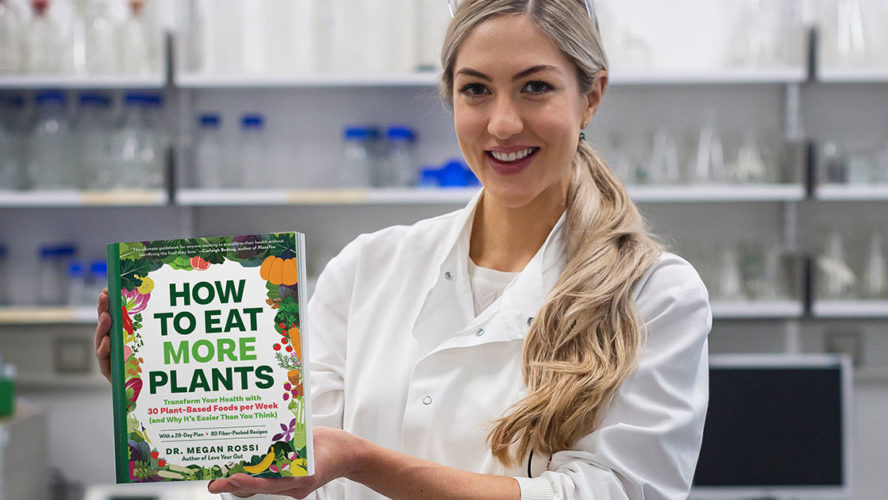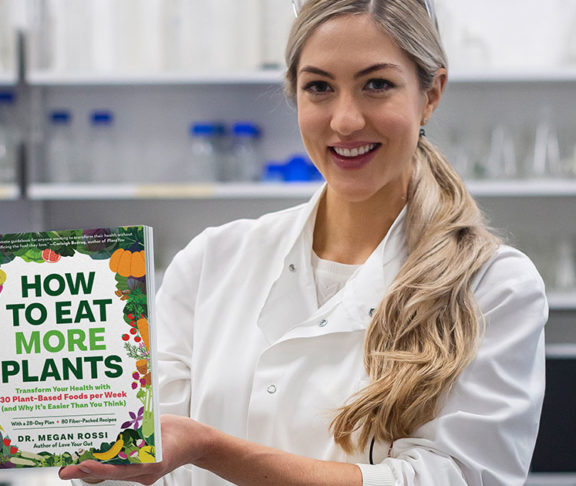Dr. Megan Rossi, author of “How to Eat More Plants,” debunks common healthy eating myths and shares her tips for a plant-based diet made easy.
What are common misconceptions about a plant-based diet?
The three most common misconceptions that I see in clinic and online are:
- That a plant-based diet means plants only. By definition, plant-based means just that — the base of your diet is plants, and then whatever you choose to add to that base is completely up to you. In “How to Eat More Plants,” I talk about the spectrum of a plant-based diet. On one end you have veganism, and at the other end is flexitarianism. In terms of health, wherever you sit along that spectrum doesn’t necessarily matter, as long as the greatest proportion of your diet comes from plants, you’re following a plant-based diet, and you’re doing the best by your gut and overall health.
- That a plant-based diet automatically means it’s healthy. There is a world of difference between the nutrition found in ultra-processed foods and that found in whole plants. It’s the latter that has been associated with optimal health, and it’s what I recommend should be the focus of any plant-based diet.
- If you have a sensitive gut, you can’t commit to a plant-based diet. Plant-based eating can absolutely be for everyone. Even if you struggle with a sensitive gut, the trick is to slowly increase the variety and number of plants into your diet over several months.

How can a plant-based diet positively impact the digestive system?
Plants are not only full of dietary fiber, but they also contain a range of plant chemicals, including polyphenols, which we know feed our “good” gut bacteria and support the right balance of bacteria in your gut. This, in turn, has been shown to support the strength of your gut lining (as the bacteria produce beneficial chemicals known as short chain fatty acids which fuel our gut lining). A plant-based diet can also help with bowel regularity, and in turn relieve common digestive symptoms such as constipation and bloating.
Why is a healthy diet beneficial for various conditions?
We’ve known for a long time that enjoying a plant-based diet is linked with lower risk of a range of chronic conditions including heart disease, type 2 diabetes, and more. However, it’s only been more recently where we’ve uncovered more of the mechanisms, i.e., how the diet has these health associations. A lot of this benefit comes down to the fact that plants feed our gut bacteria, and it’s these bacteria that play an active role in protecting our bodies from various conditions.
For example, research has shown that our gut microbiota can help regulate our appetite and blood sugar levels, which play an important role in conditions such as type 2 diabetes. Our bacteria are also thought to play a role in a range of autoimmune conditions, and studies are showing that nourishing our bacteria can even support mental health conditions such as depression. I cover how the gut influences various organs and functions — including the gut:skin, gut:hormone, gut:brain, and gut:immune connections — in an entire chapter within “How to Eat More Plants.”
If someone is experiencing digestive concerns, what are some things they should talk to their doctor about?
If you’re experiencing ongoing digestive issues, your first port of call should be to go and see your physician to rule out organic conditions such as inflammatory bowel disease, celiac disease, and colon cancer, which can be masked by digestive symptoms. When going to see your physician, to ensure you make the most of your time together, I would recommend you take a summary of your symptom history, such as when your symptoms started, how often they present, whether they are linked with your diet or stress levels, etc.

What are some cost-effective ways to improve digestive health?
My three most cost-effective ways to improve digestive health are:
1. Increase the diversity of plants in your diet. This doesn’t just mean buying fresh fruit and vegetables from your local deli, but increasing your “super six,” also known as wholegrains, fruits, vegetables, legumes, nuts and seeds, and herbs and spices. This can be as simple and cost-effective as bulking out meals with salt-free canned legumes such as chickpeas or lentils, or even buying frozen fruit and vegetables. It’s much more economical and still great for the gut! I also recommend buying fruit and vegetables that are in season. It’s much cheaper, often more nutritious, and it’s a great way to try new plants that you haven’t tried before.
2. Chewing your food more. While it might sound like a very simple strategy, it can be a game-changer for your gut health. Chewing each mouthful around 15-20 times can help support your digestive health and reduce your risk of common gut-related symptoms such as bloating. This is because digestion begins in your mouth, not only physically do you break down the food, but your saliva also contains enzymes which start to chemically break down the food.
3. Relax the gut-brain axis. Good digestive health doesn’t just come from what we eat; it’s also down to factors such as stress and sleep. Our brain and gut are constantly communicating, and I’ve seen so many clients over the years struggle with gut issues as a product of poor sleep and stress. Relaxing your gut-brain axis can have a huge impact on your digestive health, and thankfully we now have evidence-based strategies such as mindfulness and diaphragm breathing that have shown to have measurable impacts on people’s gut health. Check out some of my favorite tried and tested ways to relax and de-stress in “How to Eat More Plants.”



